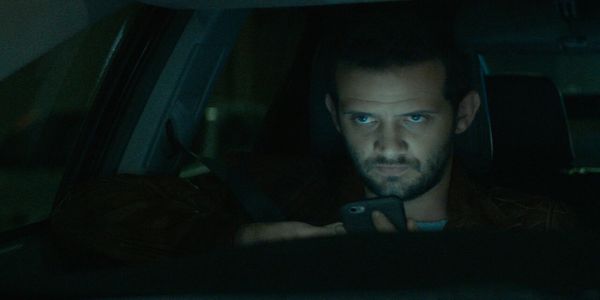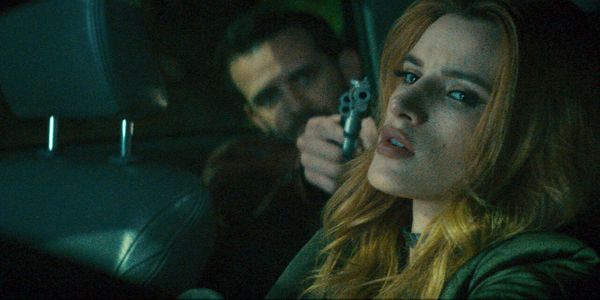RIDE: Respectable Film Drives Towards A Confused Conclusion

Tom is a recent graduate based in the UK, who…
There’s a certain simplistic beauty in setting a thriller almost entirely in a moving vehicle – when characters are in an enclosed piece of metal barrelling down roads or through clouds, the normal laws of human logic and emotion are interrupted. Locke knew it, and before that Speed, Under Siege and a plethora of plane and spacecraft thrillers used the combination of motion and claustrophobia to great ends. Ride is clearly borne from this breed of film.
Ride is the story of a driver (Jessie T. Usher) for an Uber-style lift sharing app who picks up a duplicitous client (Will Brill). It may sound like an overly basic premise – and one in which every beat can be predicted from the start – but to the film’s power this mostly isn’t the case. The film keeps its cards close to its chest in terms of character motivation, so the audience is left guessing as to what story is being told.
The two graces of the film are its script and actors, both pulling their weight to elevate the film from being a by-the-numbers thriller to an interesting and deceptive ride.
Playing the Part
Ride manages to unshackle itself from all expectations that come from its premise due to some stellar performances from Usher, Brill and Bella Thorne as the three inhabitants of the vehicle. Weak acting from any of them could have swerved the story on to the hard shoulder, but by working in tandem they keep the themes and tones of the film balanced well.

Brill’s performance as the ‘antagonist’ of the film manages to balance the fine line between intimidating and affable, with each line delivery meandering between the two like a snake through grass. His charisma in the first half of the film offsets the tension caused by his extended presence in the car, and when he does become menacing you can never be sure he’s turned into that lane for good.
Almost mirroring this balance is Usher as the protagonist, whose initial creepy turn is gradually replaced by a genial and empathetic side. He too gets to show off some charismatic finesse through some one-liners at the beginning of the film. Although Thorne isn’t featured as prominently as her co-stars in Ride, she commits to her performance admirably – especially in several scenes that require her to sing. One of the final scenes, in which the characters are forced to sing along to a song together, combines the talents of all three in one impressive scene.
Flawless Transmission
A great performance can only take a film so far, and it takes Ride’s equally great script to keep the film driving throughout.
It can be challenging to write a dialogue-heavy film like Ride, and to the film’s credit it never feels like the script is trying too hard to find a topic to discuss, or leans too hard on irrelevant small-talk. The conversation ebbs and flows between seemingly meaningless details and plot-related information in a natural way, and it keeps the film ticking well.
Ride is a dialogue film, no matter how the trailer tries to suggest otherwise, and its tension lies in the way its characters interact. The trailer does give away the important details of the film, and in doing so ruins its carefully plotted crawl, so it’s advisable not to watch it if you plan to watch the film.
The characters aren’t hugely well defined by the script but this seems intentional – you wouldn’t find out too much about someone through a car journey, and the small talk does enough to set up who these characters are. Some of the important pieces of information are contextual, which helps maintain the realistic sense of the film being simply a car journey between strangers. Brill’s character has a rather strange turn at the end, however, when he starts spouting previously-unmentioned philosophical ideas like some kind of video game villain, which feels rather jarring given his (comparatively) unphilosophical character before.

There are two points of weakness, unfortunately, which derail the film somewhat. The ‘end of the first act’ reveal seems to be far too abrupt and come too late in the film. The turn is a rather predictable one, though to the film’s credit the first act successfully convinces you it won’t happen. Its late place in the film, however, doesn’t give the film enough time to build up tension to this point, and it feels a little too sudden.
Similarly, the conclusion doesn’t provide any closure on the film. The heroes manage to escape their dangerous situation but there’s no sense that they’ll be out of trouble for long, and they don’t ever answer to their actions. Similarly, the villain doesn’t get any kind of comeuppance or retribution, and it’s heavily implied that he returns to his old tricks. For a film with such a nuanced and well-crafted script, the ending seems to drop the ball somewhat.
Ride: Conclusion
Ride works best as a vehicle for its writer/director Jeremy Ungar and the three stars, who all get to show off their impressive talents.
It isn’t exactly a revolution in filmmaking or storytelling, but it’s entertaining and interesting enough over the course of its brief runtime to not wear out. At times it’s funny, at others it’s tense, and throughout it shines bright with a passion for the city of Los Angeles, which could almost be considered a character in itself. Ride may not hit the gas to the floor, but its slower pace is a good thing.
What other useful apps would make effective thrillers? Pitch us your ideas in the comments below.
Ride was released in the US on October 5, 2018.
Does content like this matter to you?
Become a Member and support film journalism. Unlock access to all of Film Inquiry`s great articles. Join a community of like-minded readers who are passionate about cinema - get access to our private members Network, give back to independent filmmakers, and more.
Tom is a recent graduate based in the UK, who writes about films and games, and makes a few of his own. If he's not watching a film, playing a game or writing a script - don't worry! - he's probably just gone to make a cup of tea. He's never far from a screen.












